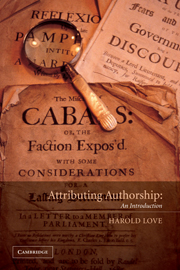Book contents
- Frontmatter
- Contents
- Acknowledgements
- List of abbreviations
- Introduction
- 1 Individuality and sameness
- 2 Historical survey
- 3 Defining authorship
- 4 External evidence
- 5 Internal evidence
- 6 Stylistic evidence
- 7 Gender and authorship
- 8 Craft and science
- 9 Bibliographical evidence
- 10 Forgery and attribution
- 11 Shakespeare and Co.
- 12 Arguing attribution
- Notes
- Select bibliography
- Index
- References
Select bibliography
Published online by Cambridge University Press: 22 September 2009
- Frontmatter
- Contents
- Acknowledgements
- List of abbreviations
- Introduction
- 1 Individuality and sameness
- 2 Historical survey
- 3 Defining authorship
- 4 External evidence
- 5 Internal evidence
- 6 Stylistic evidence
- 7 Gender and authorship
- 8 Craft and science
- 9 Bibliographical evidence
- 10 Forgery and attribution
- 11 Shakespeare and Co.
- 12 Arguing attribution
- Notes
- Select bibliography
- Index
- References
- Type
- Chapter
- Information
- Attributing AuthorshipAn Introduction, pp. 253 - 264Publisher: Cambridge University PressPrint publication year: 2002



